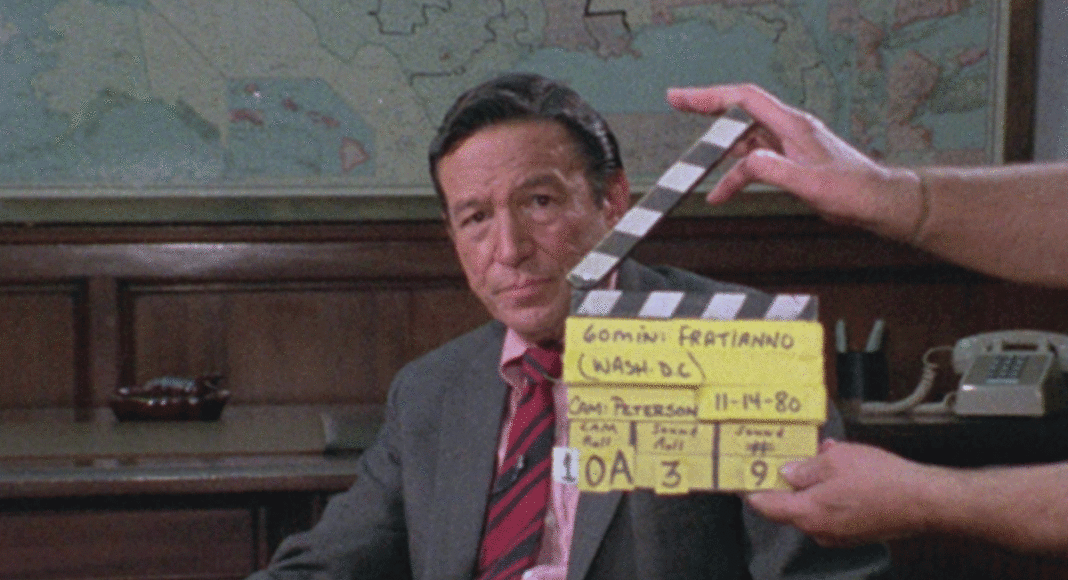Bill O’Reilly calls him “the master of nailing.” Barbra Streisand is more succinct—“You’re a son of a bitch,” she purrs.
So it’s hard to imagine someone less likely to be caught selling peanut butter in TV commercials than Mike Wallace. The intrepid TV journalist and co-host of 60 Minutes is best known for dogged, on-air interviews that struck terror into the hearts of his subjects. But Kinescope flashbacks of the youthful Wallace pitching the sponsor’s products are among the more surprising moments in Avi Belkin’s documentary Mike Wallace Is Here.
Belkin cobbles together this backstory about a footloose youth who finds himself entranced by the new mid-century medium of television. Footage of Wallace and TV growing up together as he eventually pioneers the art and craft of the live televised interview have historical and pop-cultural value, as do the many excerpts from his decades of interviewing the rich and infamous: Salvador Dali, Frank Lloyd Wright, Bette Davis, Ayatollah Khomeni, Vladimir Putin, and a puffy, young Donald Trump.
But for all the vagaries in Wallace’s career, and the variety of his interview subjects, the movie never establishes its own viewpoint. It remains a random collection of clips, many fascinating in their own right, that are never quite shaped into a larger picture or more cohesive theme. I wish Belkin had dug a little deeper to get the full story.
Hailing from Brookline, Massachusetts, and so badly acne-scarred in his teens that he figured he had “a great face for radio,” Wallace started out in that medium as a staff announcer and pitchman. But with the advent of television, he switched allegiance; he sold everything from soap to cigarettes to cosmetics on the air, hosted game shows, and was routinely thrust into minor acting roles (as documented in a treasure trove of those vintage Kinescopes).
In 1956, he came up with the idea for Night Beat, a late-night interview show featuring subjects like the Grand Wizard of the Ku Klux Klan (fulminating in his full pointy-headed satin Klan robes), gangster Mickey Cohen, and Rod Serling. This eventually morphed into The Mike Wallace Interview, a program that engendered so many libel lawsuits the network finally had to shut it down.
But while the show was dead, it gave birth to a new TV icon in allowing its host to “become” Mike Wallace. Although he went briefly back to pitching Revlon lipstick, he decided he wanted to be a serious reporter, traveling the world in search of stories, until he landed at CBS—in the august company of Walter Cronkite, Eric Severeid and Edward R. Murrow. After a few years at the network, Wallace and producer Don Hewitt co-created the concept of TV news magazine 60 Minutes, which debuted in 1968.
Concerned that he didn’t have the same hard news credentials as his new colleagues, Wallace was determined to ask the hard questions instead. We see tantalizing bits of Wallace coaxing an eyewitness account of the My Lai massacre from a Vietnam soldier, making cold-fish John Erlichman visibly sweat, and sparring with Richard Nixon and Manuel Noriega in between showbiz celebs like Johnny Carson and Shirley MacLaine.
Meanwhile, attempts by 60 Minutes cohort Morley Safer and others to interview Wallace himself are largely futile, as he rebuffs questions he doesn’t like—“Why would you ask me that?” “That’s a stupid question”— or simply does not respond.
Belkin never really discovers the man behind the public persona. Nor does he find (in what must have been hundreds of hours of footage) any particular “aha!” moment with an interview subject that would cap Wallace’s legacy.
But his take on the evolution of modern journalism fascinates. Oriana Fallaci tells Wallace she’s not a reporter but a historian, as “a journalist who writes history as it happens.” And a montage of news-bashing from Spiro Agnew to Trump reminds us to never, ever take for granted the privilege of a free press.
MIKE WALLACE IS HERE
**1/2 (out of four)
With Mike Wallace and Morley Safer. A film by Avi Belkin. A Magnolia release. Rated PG-13. 90 minutes.













